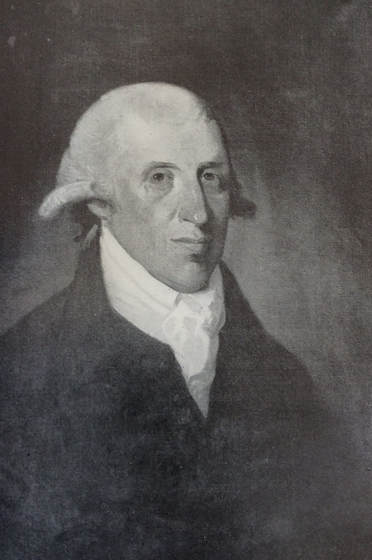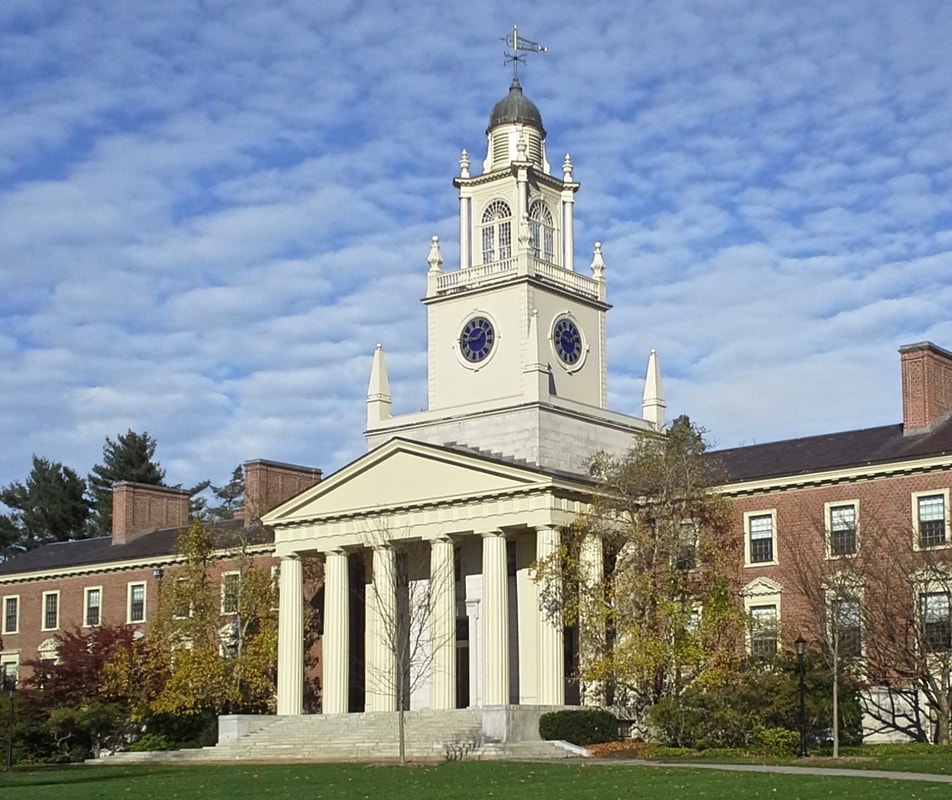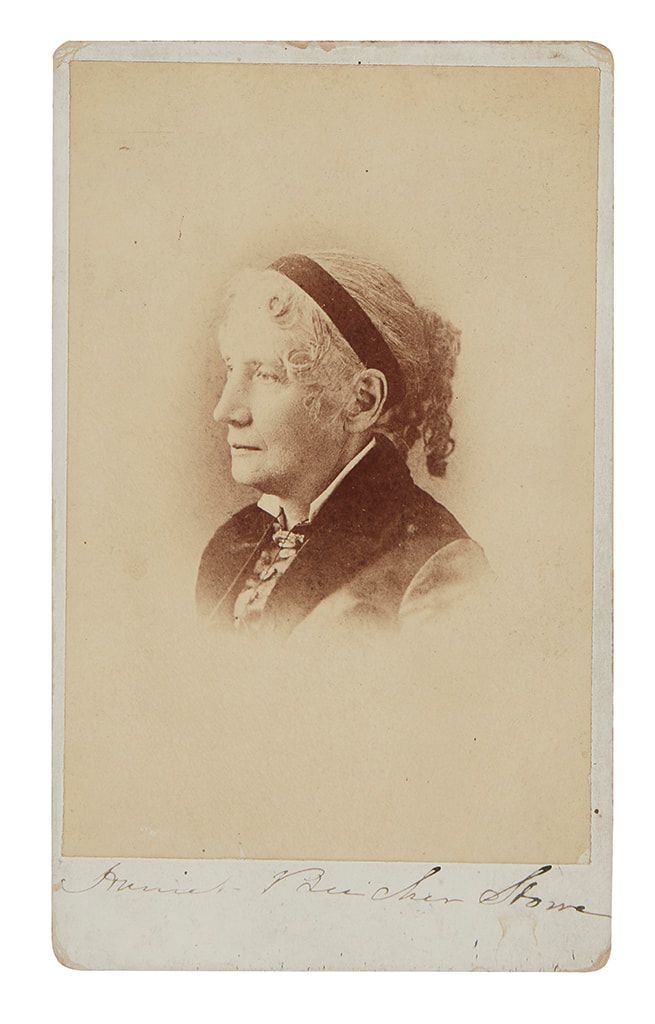 Samuel Phillips Jr.
Samuel Phillips Jr. Since it is Christmastime, my thoughts have turned to the wise Calvinists who banned it. Being that Phillips Academy’s founder, Samuel Phillips, was an ardent follower of Jonathan Edwards ("Sinners in the Hands of an Angry God" [1741]), he assuredly wasn’t trimming a tree in Andover during his lifetime here.
So when exactly did he live? Those who study Andover’s history surely must get confused, as I have been, about all the different men named Samuel Phillips. Among others, there was Samuel Phillips (1689-1771), pastor of South Church and author of "Seasonable [sic] Advice to a Neighbour, Given by Way of A familiar Dialogue; or In Answer to various Questions, relative to Five important Points of Divinity. Done with a View to promote practical Godlinessl and designed, especially, for the Use of the Inhabitants of the South Parish in ANDOVER. To whom it is Dedicated (1761). There was his son Samuel Phillips (1715-1790), who briefly taught the town grammar school, got involved in colonial politics, was our town moderator prior to the American Revolution, and wasn’t sure he wanted to separate completely from Britain. And then there was his son, Samuel Phillips (1752-1802). He is the one who made the biggest impact both on our municipality and in the wider world.
A graduate of Harvard (class of 1771) at age nineteen, Samuel Phillips III had been named Andover’s town clerk and treasurer by 1774, at which time he headed a committee that drew up a resolution declaring "that no person in this town, who has heretofore been concerned in vending tea, or any other person, may not under any pretense whatever, either sell himself, or be in any way accessory to selling any tea of foreign importation, while it remains burdened with a duty, under penalty of incurring the town's displeasure." It would be coffee or chocolate thereafter or nothing, Then in 1775-1776 he was our delegate to the Provincial Congress at Watertown, Massachusetts, joining such others as Samuel Adams and John Hancock.
During the war, Samuel Phillips built a powder mill in Andover, near present day Marland Place, and sold the product to George Washington’s army for eight cents a pound. After the war, he gradually transformed the powder mill into a paper mill. He also established a sawmill and a gristmill, and ran two retail establishments, one in Andover, another in the town next door, Methuen. In addition to his entrepreneurial ventures, he engaged in state politics, being elected state senator, then president of the senate after Sam Adams resigned. Later John Hancock appointed him one of the Justices of the Court of Common Pleas for Essex County. At the peak of his political career, he was elected Lieutenant Governor on the Federalist ticket; Caleb Strong was Governor. One wonders when he had time to found Phillips Academy, but he did, in 1778, when he was twenty-six — with funding from his father and uncle John Phillips (1719-1795).
So was Christmas celebrated at P.A. in its early years? Not a chance, since Calvinism was its prevailing philosophy. Indeed, there were classes on Christmas Day, according to Claude M. Fuess's history, An Old New England School. Also according to Fuess's research, Daniel Appleton White (1776-1861) was invited to turn down a previously offered position as a P.A. "assistant" (i.e., teacher) because, as a Harvard senior, he had made the mistake in his commencement essay of expressing disbelief in the dogma of human depravity. Whereupon Samuel Phillips told young White it might be wise for him to consider another profession, which he did. He studied law and became a judge. Today he is known chiefly as the founder of the White Fund, a philanthropic foundation that gives money to benefit causes in Andover’s mill-city neighbor, Lawrence -- which, after all, may be the best representation of the true spirit of the season.
Merry Christmas!
So when exactly did he live? Those who study Andover’s history surely must get confused, as I have been, about all the different men named Samuel Phillips. Among others, there was Samuel Phillips (1689-1771), pastor of South Church and author of "Seasonable [sic] Advice to a Neighbour, Given by Way of A familiar Dialogue; or In Answer to various Questions, relative to Five important Points of Divinity. Done with a View to promote practical Godlinessl and designed, especially, for the Use of the Inhabitants of the South Parish in ANDOVER. To whom it is Dedicated (1761). There was his son Samuel Phillips (1715-1790), who briefly taught the town grammar school, got involved in colonial politics, was our town moderator prior to the American Revolution, and wasn’t sure he wanted to separate completely from Britain. And then there was his son, Samuel Phillips (1752-1802). He is the one who made the biggest impact both on our municipality and in the wider world.
A graduate of Harvard (class of 1771) at age nineteen, Samuel Phillips III had been named Andover’s town clerk and treasurer by 1774, at which time he headed a committee that drew up a resolution declaring "that no person in this town, who has heretofore been concerned in vending tea, or any other person, may not under any pretense whatever, either sell himself, or be in any way accessory to selling any tea of foreign importation, while it remains burdened with a duty, under penalty of incurring the town's displeasure." It would be coffee or chocolate thereafter or nothing, Then in 1775-1776 he was our delegate to the Provincial Congress at Watertown, Massachusetts, joining such others as Samuel Adams and John Hancock.
During the war, Samuel Phillips built a powder mill in Andover, near present day Marland Place, and sold the product to George Washington’s army for eight cents a pound. After the war, he gradually transformed the powder mill into a paper mill. He also established a sawmill and a gristmill, and ran two retail establishments, one in Andover, another in the town next door, Methuen. In addition to his entrepreneurial ventures, he engaged in state politics, being elected state senator, then president of the senate after Sam Adams resigned. Later John Hancock appointed him one of the Justices of the Court of Common Pleas for Essex County. At the peak of his political career, he was elected Lieutenant Governor on the Federalist ticket; Caleb Strong was Governor. One wonders when he had time to found Phillips Academy, but he did, in 1778, when he was twenty-six — with funding from his father and uncle John Phillips (1719-1795).
So was Christmas celebrated at P.A. in its early years? Not a chance, since Calvinism was its prevailing philosophy. Indeed, there were classes on Christmas Day, according to Claude M. Fuess's history, An Old New England School. Also according to Fuess's research, Daniel Appleton White (1776-1861) was invited to turn down a previously offered position as a P.A. "assistant" (i.e., teacher) because, as a Harvard senior, he had made the mistake in his commencement essay of expressing disbelief in the dogma of human depravity. Whereupon Samuel Phillips told young White it might be wise for him to consider another profession, which he did. He studied law and became a judge. Today he is known chiefly as the founder of the White Fund, a philanthropic foundation that gives money to benefit causes in Andover’s mill-city neighbor, Lawrence -- which, after all, may be the best representation of the true spirit of the season.
Merry Christmas!


 RSS Feed
RSS Feed
